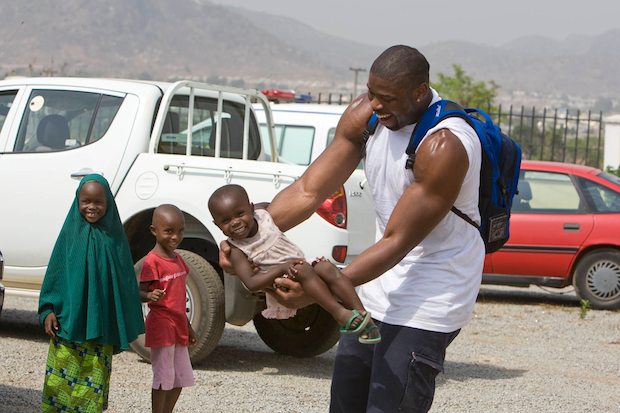Q and A with Israel Idonije of the Chicago Bears
Israel Idonije is one of the NFL’s great humanitarians. Born in Nigeria, the defensive tackle for the Chicago Bears started the Israel Idonije Foundation three years ago and has been giving back ever since. The Foundation’s efforts range from aiding inner-city youth to providing basic necessities for survival to Nigerian children. On March 19th, the Israel Idonije Foundation will embark on its third C.A.R.E. Africa trip to Nigeria. I recently had the opportunity to spend a few minutes with Israel where we talked about the Foundation’s work more specifically, the impressive partnerships he’s made for the Nigeria trip, and the prospects of the NFL fostering more direct development in a country that has produced Osi Umenyiora, Adewale Ogunleye, Nnamdi Asomugha, and, of course, Israel Idonije.
The Football Girl: I’m honored to be joined today by Israel Idonije of the Chicago Bears, one of the biggest do-gooders in the NFL and beyond. Thanks for joining me, Israel.
Israel Idonije: Thanks for having me.
TFG: Let me start by getting the obligatory on-the-field stuff out of the way. What has been your reaction to the new look, free-spending Bears?
II: It’s exciting, the off-season and the changes being made. They’re trying to make the team better and I think we’re doing that. We’ve had some great acquisitions and coaching staff, across the board there’s been great changes. We’re going into training camp with a chance at a very positive season.
TFG: Let’s talk about the reason you’re here today and that’s your upcoming C.A.R.E. trip to Nigeria. Why don’t you start off by talking about the Israel Idonije Foundation, the idea behind it and all of the far-reaching programs the foundation supports? In other words, how are you improving lives?
II: I started it in 2007. I really wanted to do something in the community. My parents are ministers so I grew up with service. Every year it was ‘I’ll do it next year’ and eventually I just kicked it off with an attendance program for a school in the inner-city; that year they had the most improved attendance in the district and we kept growing from there. We work with four schools in the South side of Chicago, working on education and youth empowerment, teaching kids that education is the key to your success. And then we branched out. We do something called C.A.R.E. Africa. It’s our third year doing that – going to Africa. We have a team of eleven doctors that accompany us to do free medical clinics throughout rural areas and villages. We also build water wells and youth sport camps. It’s been a lot of fun.
TFG: How do you have time to focus on your on-the-field duties?
II: It’s tough, but I’ve learned to juggle. Once it’s time for football that becomes priority number one.
TFG: I want to get back to the Nigeria trip in a second, but let’s revisit your attendance program first. How do you get kids to go to class? What incentives do you provide?
II: We just want them to experience things they never experienced before, so it’s a goal. We’ve taken them to see Wicked when it was in Chicago here. They love Safari Land, bumper cars, that type of stuff. Oh, we take them to dinner at some of the nicest restaurants in Chicago, so we just try to touch on different things. The idea is that every kid can get involved in something they may enjoy.
TFG: As a former Chicago resident, I’m kind of curious what restaurants you’re taking them to considering how sweet the Chicago dining scene is and all.
II: It certainly is. We’ve taken them Petterino’s,where they laid out this huge spread for us. We’ve been to Joe’s and that was another above and beyond effort. The kids came and they were all dressed up and got to order whatever they wanted like steaks. It was just an experience.
TFG: Great. Back to Nigeria, talk about the mission for the upcoming trip?
II: We leave on the 19th and will be there through the 29th. We’ve partnered up with Share your Soles, a non-profit organization that distributes shoes to people shoeless all over the world. We’ve raised through Illinois 1,200 pairs of shoes, which we’ll be boxing up and distributing those to kids and people who need shoes. That was a huge need we saw over the previous two years. We have a young lady named Kasia Muoto, she works with the organization Play to Win, and she was one of Nigeria’s youngest female soccer players. She’s amazing when it comes to empowering these young women, helping them understand they’re more than their cultural restraints and what society says about them. They can achieve more, be more, do more. She’s a great asset to our team as far as reaching out to these youth. It’s a lot of fun. It’s a full trip of giving. And we receive a lot. It’s very gratifying and puts things in perspective when you’re able to touch a life in the way that some of the people on our team do.
TFG: We see you or we see an Adewale Ogunleye and you guys are obviously doing quite well. Can you talk about just how dire the situation is in Nigeria?
II: It’s tough. Some of the areas we go to have scores of children who have never worn shoes on their feet, and that’s just the tip of the iceberg. You talk about not having adequate drinking water, so over the last few years we’ve been able to build three water wells. There are people drinking water out of the same reservoir where cows and livestock drink — it’s not healthy. For Wale (Adewale Ogunleye) and I and other guys who’ve gone on the trip and those still to come, it’s about us doing the little bit we can. If everybody does something it goes a long way and makes a big impact.

Israel playing with kids in Nigeria. (Photo credit: Tom Thomson Photography)
TFG: That’s great humanitarian work out of you guys. Now how do the people of Nigeria perceive American football?
II: I think it’s going to be okay. Last year, it’s funny, American football is still a game they’re trying to grasp so we did two youth football camps last year and we’ll also do them again this year. You could see the progression to being able to catch balls and eventually they were running better routes. You could see them learning fundamental skills of the game we were teaching. This year, The Chicagoland Youth Football League (TCYFL) donated forty sets of actual football equipment. This will be the first time we’ve put kids in actual pads and get them to run around. It’s going to be a lot of fun just to take the game to the next level. We’re looking forward to that and opening them up to new experiences and letting them see there are no limitations.
TFG: Now there’s clearly an influx of Nigerian-blooded players in the NFL. Do you think the NFL could be doing more to foster development such as having a scout stationed there?
II: I think it’s too early to have scouts there. Now, it’s about building something in country that allows people to understand the game. I think you do that and it goes a long way. To have something in Nigeria that teaches the game, that helps kids develop, that’s another tool for future success. And once the kids are developing and coming along, you send scouts there to look at the kids and they can go from there. The NFL, like you said, has handfuls of Nigerian players
TFG: Well, we look forward to hearing the report from your trip. Thanks for joining me, Israel.
II: Thank you. Have a great day.
To learn more about The Israel Idonije Foundation, click here.
The Foundation’s website will posting daily blog posts from Africa beginning on 3/21.



